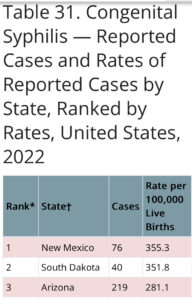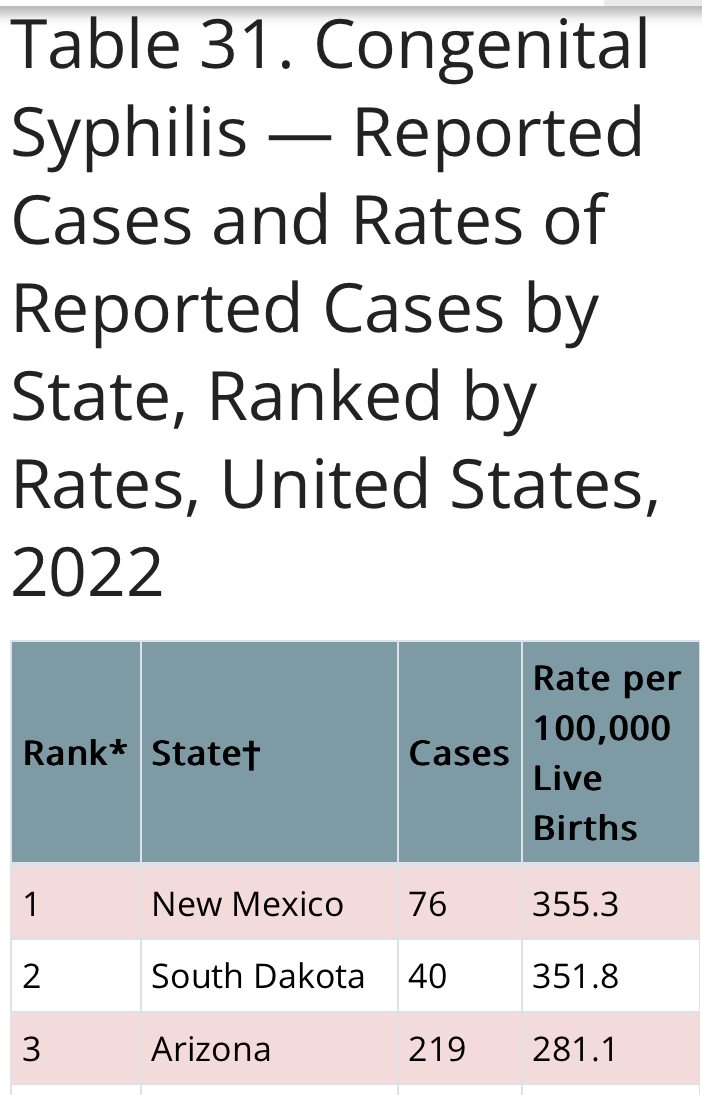Syphilis cases increased 80% in the United States between 2018 and 2022, and rates are now comparable to those in the pre-antibiotic era. Arizona now ranks 5th highest in the nation for primary and secondary syphilis rates & 3rd highest in congenital syphilis.
Why syphilis in newborns in an ongoing crisis in Arizona (via Stephanie Innes, Arizona Republic)
“In Arizona, the problem is particularly acute. State data shows the number of babies born with syphilis went from 17 in 2016 to 219 last year, which was a nearly thirteenfold increase over seven years…. the number of babies who died from syphilis more than doubled from 14 to 32.”

If untreated, syphilis can seriously damage the heart and brain and can cause blindness, deafness, and paralysis. When transmitted during pregnancy, syphilis is particularly concerning- causing miscarriage, stillbirth, prematurity and even death shortly after birth. Babies that live can have:
- Deformed bones
- Severe anemia (low blood count),
- Enlarged liver and spleen,
- Jaundice (yellowing of the skin or eyes),
- Brain and nerve problems, like blindness or deafness,
- Meningitis
CDC’s recent Vital Signs report, Missed Opportunities for Preventing Congenital Syphilis — United States, 2022, showed that timely syphilis testing and treatment during pregnancy might have prevented almost 9 in 10 (or 88%) congenital syphilis cases in 2022.
Vital Signs: Missed Opportunities for Preventing Congenital Syphilis — United States, 2022 | MMWR
More than 37% of babies with congenital syphilis were born to persons who had received no prenatal care (national data).
Among congenital syphilis cases, no or no prompt testing during pregnancy was the most often missed opportunity found among birth parents without documented prenatal care.
Innovative solutions like partnerships with retail health or pharmacies, STI express clinics, and setting up injectable syphilis treatment delivery programs can jump-start care for people.
In addition to improving access to prenatal care (and screening for syphilis among those who do have prenatal care), approaches to providing care outside of clinical settings (e.g., use of rapid tests & active case follow-up) are needed.
Screening for syphilis at encounters outside traditional prenatal care (e.g., emergency department, jail intake, syringe services program, and maternal and child health programs) might help find and treat persons with syphilis who might not otherwise receive adequate prenatal care.
National Overview of STIs, 2022 (cdc.gov)
Perhaps an Executive Order is called for charging ADHS to use executive public health authority to coordinate enhanced surveillance & interventions identified in R9-6-381 (like specific directives to licensed healthcare institutions) and work with other sectors like corrections, ADES and AHCCCS to implement evidence-based interventions.
